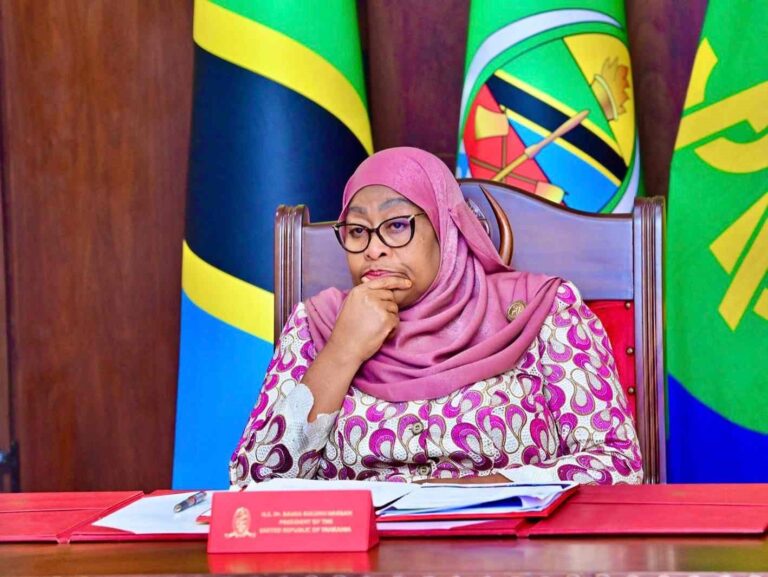In March 2021, Tanzania made history. For the first time since its independence, the country swore in a female president, Samia Suluhu Hassan.
Known for her calm yet firm approach, Suluhu’s journey to the highest office in the land is a testament to resilience.
From her roots in Zanzibar to leading a nation with over 60 million people, her story is both inspirational and symbolic of a slowly shifting political landscape in East Africa.
Early Life and Education
Born on 27 January 1960 in the Sultanate of Zanzibar, Suluhu’s childhood was shaped by the island’s rich cultural heritage and political transformation.
Just four years after her birth, Zanzibar merged with Tanganyika to form Tanzania. Suluhu completed her secondary education in 1977 and started her professional journey as an office clerk.
Despite her humble beginnings, she held onto her ambition, pursuing several short courses to build her skills. In 1986, she earned an advanced diploma in public administration from the Institute of Development Management (now Mzumbe University).
Her quest for knowledge continued overseas, obtaining a postgraduate diploma in economics from the University of Manchester between 1992 and 1994.
In 2015, she capped off her academic journey with an MSc in Community Economic Development through a joint program between the Open University of Tanzania and Southern New Hampshire University.
Political Career
Suluhu’s public service career took off in 1988 when she became a development officer with the regional Zanzibar government.
She later worked as a project manager with the World Food Program and led a regulatory body overseeing non-governmental organisations in Zanzibar. This phase of her career laid the foundation for her entry into national politics.
In 2000, she was appointed a special seat member of the Zanzibar House of Representatives under the ruling Chama Cha Mapinduzi (CCM) party.
Her appointment as Minister for Youth Employment, Women and Children marked her entry into executive leadership. During her time in this role, she championed the right for new mothers to return to school.
She later served as Minister for Tourism and Trade Investment after being re-elected in 2005. Her political rise continued with her successful election to the National Assembly in 2010, representing Makunduchi with an overwhelming majority.
She was then appointed Minister of State for Union Affairs by President Jakaya Kikwete and later elected Vice-Chairperson of the Constituent Assembly that worked on drafting the country’s new constitution.
Vice-Presidency and Rise to the Top Seat
In a surprising move, Suluhu was selected as the vice-presidential running mate by the late John Magufuli in the 2015 general election.
It was a historic moment, as she became the first female running mate in CCM’s history. After their electoral victory, she took office as Tanzania’s first female vice-president.
Despite early tensions in her relationship with Magufuli, Suluhu managed to navigate internal political challenges and maintain her influence.
The Magufuli-Suluhu duo was re-elected in 2020, although that election was marred by accusations of fraud.
When President Magufuli died unexpectedly in March 2021, Suluhu stepped into the presidency, as required by the constitution. Her swearing-in on March 19 marked a significant moment not just for Tanzania, but for African politics. She became the only female head of government on the continent at the time.
Leadership and Controversies
Suluhu’s leadership style is often described as soft-spoken but firm. Upon taking office, she was perceived as a democratic shift from Magufuli’s authoritarian rule.
She eased restrictions on the media, released political detainees, and met with opposition leaders. One of her boldest moves was lifting the ban on political rallies, reinstating a vital space for public participation.
In 2022, she was named among the top 100 most influential people by Time magazine, underlining her growing presence on the global stage. As the 2025 general election approaches, she is expected to seek a new term, now with a firmer grip on the ruling party following political reshuffles and re-alignments.
However, her presidency has not been without criticism. Her government has faced increasing scrutiny over the arrest of opposition leaders, crackdowns on activists, and reports of enforced disappearances. These developments have sparked concern both locally and internationally.
Tanzanian Conflict with Kenya
Suluhu’s presidency has also seen diplomatic tensions with Kenya. The Tanzanian government’s treatment of Kenyan activists, who were denied entry while attempting to observe the trial of opposition figure Tundu Lissu, drew strong reactions.
Reports of torture and deportation led to a diplomatic standoff, with Suluhu warning against foreign interference in Tanzania’s domestic affairs.
Marriage: Husband and Children
Beyond politics, Suluhu is a family woman. She is married to Hafidh Ameir, an agriculturalist who is reportedly a polygamous man. While the exact number of co-wives or Suluhu’s position among them remains private, she and Ameir share four children, three sons and a daughter.
Their daughter, Wanu Hafidh Ameir, followed her mother’s footsteps into public service and currently serves in the Zanzibar House of Representatives.
Will Suluhu serve for second term?
President Samia Suluhu Hassan stands as a symbol of change in Tanzania’s political scene. While her leadership has been applauded for pushing key reforms, it has also faced scrutiny over emerging human rights issues.
Her political future now rests in the hands of voters as the country heads into general elections later t




